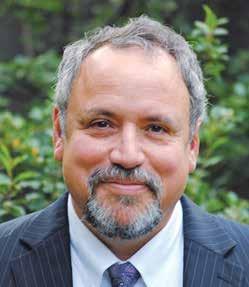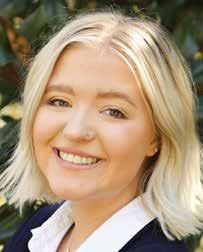Bruce Schonberger


Your Opinon is Valuable
Get involved in the ND legislative session
Greetings, and welcome to the column! I hope this communique finds you all well. I am sure it will find you busy providing the vital public services our citizens depend on every day.
As you know, the 68th ND State Legislature is working steadily to complete its work before its 80-day session expires. Your ND United lobby team has been at the Capitol every day making sure that your voice is heard on myriad issues important to our members and their families. We began the session tracking 125 bills. That means sitting through many hearings and writing and delivering testimony on a variety of bills. We do it because we know what you know: Every decision that impacts your workspace is a political decision made at the federal, state or local level. It is important that our legislators understand how their decisions impact the lives of all our public servants.
As I write this on the eve of crossover, when bills from one chamber move to the other, it is clear that there is still much work to do before the legislature adjourns sine die. Among the difficult decisions yet to be made are salary increases for public employees, K-12 education funding, whether to continue or close the defined benefit retirement plan administered by PERS, higher

education funding, as well as decisions on myriad culture war issues. All of these issues will have a direct or indirect impact on our members and our society, so it is eminently important that we make our voices heard.
That’s where you come in! You are incredibly important to the work we do on behalf of all of our members at the Capitol. We know from our outstanding NDU Lobby Day engagements that legislators value your opinion and want to hear from you. You may not know that hundreds of our members have been contacting their legislators on the important issues before them on a regular basis. You can, and should, too.
It is easy to become an ND United Activist Member. Our outstanding team will make sure you have all the information you need on the important issues that matter most to you. In addition, you can join us on our twice monthly Legislative Session Organizing call. At these informative meetings, we will give you up-to-the-minute news on the issues of the day as well as some behind-the-scenes insight on how the sausage gets made in Bismarck. To learn more, please visit ndunited. org/issues-action.
Thanks for your good work and for all you do in service of others.
2023 Legislative Update

Thank you to our Lobby Day attendees and supporters! We had a successful day filled with direct conversations with legislators, a Q&A session with the House Education Committee, a North Dakota United press conference, and plenty of member camaraderie.
This report was written during crossover, the break the Legislature takes halfway through the session before all bills passed in one chamber go to the other for consideration. Changes and action on these bills may take place before this issue of United Voices arrived in your mailbox.
You can get the most up-to-date information at www.ndunited.org/issues-action/ or by emailing your questions to legislative@ndunited.org
Vouchers — HB 1532
After receiving a do not pass recommendation out of House Appropriations, we were hoping for a vote on House Bill 1532 on our Feb. 20 Lobby Day while our members attended the House Floor session, but the bill was laid over and heard
on Tuesday instead. It’s likely the supporters of this bill were nervous about our presence! Discussion continued for over an hour, with many legislators mentioning the number of emails they received opposing HB 1532. Representative
Novak, who sits on the House Education Committee and originally voted to pass this bill, spoke about how she received an email from the teacher (an NDU member!) of one of her children urging her to vote no on HB 1532. For that reason, Representative Novak joined in opposition, voting against the voucher bill. After additional discussion, the vote was recorded and – unfortunately –HB 1532 passed 54-40.
While this was not the outcome we were hoping for, your pressure was an integral part of ensuring this was a close vote. Representative Novak flipping her vote is clear evidence that your personal emails are working. Many of the Representatives who opposed this bill shared the same reasons we are concerned about 1532. Now we take our fight to the Senate. Keep up the pressure! Stay tuned for more opportunities to do so.
Pensions — HB 1040 (bad bill) & SB 2239 (good bill)
HB 1040 would replace the current defined-benefit pension plan with a less stable defined contribution plan by 2025. The defined benefit retirement plan is a valuable recruiting tool for North Dakota job growth and provides stable retirement savings for our workers. Eliminating the plan will cost upwards of $5.5 billion over the next 20 years, covered by taxpayers. We should be focused on investing in our pensions, not eliminating them, which is why we oppose House Bill 1040. Unfortunately, HB 1040 passed the House by a vote of 77-16. Like the voucher bill above, this bill will now go to the Senate for additional discussion and amendments before a final vote. We will continue our fight to defeat HB 1040 and save the defined-benefit pension plan!
Meanwhile, Senate Bill 2239, aims to invest in our current defined-benefit pension plan and preserve a popular benefit for under $1 billion. On the other hand, HB 1040 above would cost $5.5 BILLION over 20 years. More than five times the cost! Not only does SB 2239 maintain and invest in our defined-benefit pension plan, it is also clearly the more fiscally responsible choice. SB 2239 passed in the Senate with a vote of 34-13. As expected, state pensions are a major concern this session. Given how pressing this issue is, we expect this fight to continue to the very end of the session, and we are glad to have Representative Boschee and Senators Cleary and Dever with us to pass SB 2239.
Funding — SB 2284 (K-12), SB 2001 (State Agencies), and HB 1003 (Higher Ed)
This session, we have consistently advocated for increased funding for equitable salary increases of at least 8% for all education and public employees. SB 2284 was passed with a placeholder of 3% in each year of the biennium, subject to
Child Care — SB 2301
North Dakota United supports a long and lasting investment by the State of North Dakota in quality pre-K and child care that pays particular attention to the workers providing these services to set our kids up for success in school and ease the
the March Revenue Forecast. It will now be considered in the House. SB 2001 and HB 1003 were both passed in their respective chambers and will crossover to the other chamber for consideration.
burdens on working families. SB 2301 is a good start to investing in our state’s child care system. NDU supports this bill and will continue to push to invest $150 million into child care.
House Bill 1446, meant to weaken tenure and give more power to university presidents, passed in the House on Feb. 20 by a vote of 66-27. If this bill passes, the presidents at Bismarck State and Dickinson State would have
nearly unilateral power to fire a tenured professor, with no fear of retaliation and a minimal appeals process available to professors. We will need your help to defeat this bill in the Senate, so please stay tuned for updates!
Censorship in our Libraries — HB 1205
We are hearing from more and more members, particularly our librarians, about their concerns surrounding this bill. We have
been working with partner organizations to help lift up the voices of our members.
School Lunches and Anti-Lunch Shaming — HB 1491 & 1494
North Dakota United has been a strong advocate for universal school lunches and ending the practices of lunch shaming. We are excited that we are seeing movement on each of these items with these bills. HB 1494 makes a $6 million investment to help expand the number of
families who are eligible for free and reduced meals, and HB 1494 would outlaw lunch shaming practices that harm our students and families. We will continue to share coalition efforts to pass both of these bills.
Lifetime Licensure Requirements — HB 1329
Thanks to the idea that sprouted from a member, we were able to work with Representative Ista from Grand Forks to introduce, and pass in the House, a bill that will reduce the years of

service needed for a lifetime license from 30 years to 20. This will help recognize our longterm educators and assist with the retainment crisis we are facing across the state.
North
providers and help to stabilize access to affordable services.
Left to right: Anita Fettig, program director of Fettig Daycare in Napoleon, N.D.; Erin Laverdure, president of Energy Capital Cooperative Child Care; Landis Larson, president of North Dakota AFL-CIO; Nick Archuleta, president of North Dakota United; Josh Kramer, executive vice president and general manager of North Dakota Association of Rural Electric Cooperatives; Brian Gion, cooperative development specialist for North Dakota Association of Rural Electric Cooperatives ; Mohamed Hussein, vice president of operations at Jasmin Services; and Robin Fuehrer, director of Community Church Child Care.
Continued on next page.
Continued from previous page.
North Dakota United President Nick Archuleta and our staff also presented testimony on the following bills that are still being considered:
HB 1219 – Retired teachers’ calculated benefit and service credit for return to classroom. Support
HB 1329 - Allows ESPB to issue lifetime license after 20 years (currently 30). Support
HB 1337 – Requires schools to report safety expenditures to DPI. Oppose
HB 1362 – Takes curriculum decision-making authority from the district. Oppose

HB 2032 – Appropriation to DPI for the paraprofessional-to-teacher program. Support
HB 2033 – Teacher shortage loan forgiveness. Support
SB 2247 – Applies to institutions of higher education and “divisive concepts.” Oppose
SB 2258 – Retired teachers’ benefits in a critical shortage area. Oppose
SB 2260 – Takes curriculum decision-making authority from the district. Oppose
SB 2284 – K-12 funding bill. Support
SB 2354 – Pilot stipend program to K-3 teachers teaching a foreign language. Support
HB 1039
HB 1271
HB 1403
HB 1486
HB 1505
SB 2250
SB 2270
SB 2369
North
Testimony was also presented on the following bills that failed and will no longer be considered by the other chamber:Dakota United President Nick Archuleta testifies in support of SB 2301, relating to the establishment of a child care stabilization program.
Up next...
Advocacy Training
Whether you have been involved for years or are interested in getting started for the first time, we will be providing advocacy trainings where members can learn more about the importance of their advocacy, how to get started and some best practices. The same training will be provided every two weeks starting Tuesday, Feb. 28 at 6pm, so choose the Tuesday that works best for you. You only need to attend once to get all the information!
REGISTER HERE!
Legislative Debrief Calls
These calls are not only an exciting way to interact with the team at the Capitol representing you, but also an excellent opportunity to ask questions about legislation that is on your mind. Join us via Zoom on March 7 at 6pm for the call.
REGISTER HERE!
These updates involve the most urgent matters relating to our top priorities. We’re monitoring many more bills and issues, and encourage you to stay tuned to your email for action alerts as the session progresses. Head to our bills of interest page to stay informed on other bills we’re monitoring!
If you have any questions, comments, ideas, etc. please contact us at legislative@ndunited.org



Minot custodian Bruce Schonberger reflects on his career in service to students and winning

the 2023 ESP of the Year award.
Truest Rewards of a Job Well Done
By Kelly Hagen, kelly.hagen@ndunited.orgIt’s a cold February day in Minot, and Central Campus High School custodian Bruce Schonberger is five hours into a typical day on the job. He’s already cleaned the lower gym and classroom, office area, guidance office, biology department and the lower tech ed department, and all that before the doors opened for students at 7:30 a.m. He’s helped to monitor students as they arrive to school, then set up tables in the upper commons area for special needs students to have art class. After doing some more general cleaning tasks and a short break, he’s back to setting up more tables
in the commons area for students to have lunch. He’s quickly eaten his own lunch with his colleagues, checked for any lights and ballasts that are out, and cleaned up an energy drink that a student spilled. Now it’s 10 a.m. on a mostly typical day on the job, in the midst of a less-than-typical school year for Schonberger. This past October 24, he showed up for a normal day of work and was surprised to find himself at the center of an award ceremony as the 2023 North Dakota United Education Support Professional of the Year.
“It was real surprising,”
Schonberger said. “I don’t do it for the awards; it’s my job. I want to do it right. And when people were asking me about all the different things I do, I never really thought of all the different things I do for the union. It just never occurred to me, like why I do this. … It was just normal for me to do all this stuff. So, yeah, to be awarded this award was really just beyond my belief.”
“Education support professionals, whatever their jobs, play a vital role in the education of our students across North Dakota,” ND United President Nick Archuleta said. “Custodians are charged with keeping the learning environments accessible, clean and safe for kids, and they take these responsibilities seriously. Bruce is a sterling example of the men and women who don’t just take pride in maintaining the buildings in which our children learn, but also take pride in being part of the team that supports these kids every day. He has proven himself to be a confidant and trusted advisor to many young people as they work their way through school.”
Schonberger has worked for Minot Public Schools for over a decade, starting at Lewis and Clark Elementary School before moving over to Central High. In her nomination letter for Bruce, Minot Education Association President Kristi Reinke said that, in addition to his custodial and building maintenance responsibilities, he also serves
on the MPS Safety Committee and helps handle emergencies and unexpected problems at one of the largest schools in the district.
“One of his favorite things is to have the opportunity to be out in the halls with the students,” Reinke said. “Particularly, he loves to spend time with the special-needs kids in his school. He shares high-fives, helping them when they are having rough times and being there for the special times. Seeing their smiles makes my days better, as I am certain, seeing his face makes their days better, as well!”
Schonberger confirms that it’s his interactions with students – as big as watching them grow up and getting to know them and their parents, or as simple as a shared high-five in the hallways – are always a highlight of his job.
“I started in elementary, and this is probably my last year that I’ll have kids that I remember from elementary coming up and they still remember me from back in elementary school,” he said, as Central Campus is being renovated into a middle school, starting next year.
“They’ll still come up and say hi,” Schonberger continued, “and kids are just kind of in awe that … why are you saying hi to the custodian? (And they’ll answer), I’ve known him since I was little. And for them to remember that all the way through up until now, it’s real
special and that means something.”
While teachers, paras and school counselors are always on hand for students to talk to about their problems, anxieties or the parts of student life that make them happy, it’s often the administrative staff, like the school secretaries and custodians, who can earn a special level of trust and confidence.
“You know, kids don’t look at the custodians as an authority figure,” Schonberger said. “They’re looking at more of the normal, everyday person to where they can talk to us and we can help them out with different things. And we listen to them and try to give them the best advice we can. … There are times where, okay, maybe we should go talk to a counselor about it, and I’ll come with you, until you’re comfortable, and then I’ll let them do their job. But we’re more of the normal, everyday person type. We don’t wear a suit and tie. We’re not telling you what to do all the time. So, (maybe) it’s more relaxing to talk to a custodian or the cooks or even the secretaries, you know.”
Schonberger has also been extremely involved with his local association and all of the ESPs who work with him in Minot. He is the financial officer for Local #52, which consists of custodian classified staff in Minot. Their local is the only group of education support professionals who negotiate a
collective bargaining agreement regularly with their school district, due to past practice that dates back to before the 1969 legislation that formalized the collective bargaining for teachers in the state.
“We use it as a big recruitment tool,” Schonberger said. “Our benefits are the same as the teachers. Most of our negotiations, basically they negotiate first, and they do our wages and benefits. And then, after they’re done, we negotiate. … We work with the teachers on how well that’s going to work, and so far it’s all been real quick lately because the big (topics) are done. So, if we have some minor things we want to try to change, we discuss that over negotiations.”
He regularly attends monthly Building Representative meetings of the Minot Education Association and reports on the work his local is doing for their schools. He is also the vice president of the Central Labor Council of the ND AFL-CIO.
Next up for Schonberger is the National Education Association’s ESP of the Year Award competition. Each year, the NEA and NEA Member Benefits select one ESP member from among all the state nominees to receive national recognition at the annual NEA ESP National Conference. This year’s conference is scheduled in Seattle on March 24-26.
“I’m looking forward to it,” Schonberger said about the national conference, and he
plans to take his wife along with him. “They have some really great workshops to go to. … I’ve been to Seattle before, and we get some free time, so we’ll do a little sightseeing.”
As for possibly winning the national award, Schonberger said the truly special rewards he’s received during his career have been the relationships he’s built over the years, with his co-workers and the students he’s watched grow into adults. “My first day of actual school,” Schonberger said, “when I started at Lewis and Clark Elementary, I had three young ladies that (had) been friends for a long time, and I was nervous. I hadn’t worked in the public sector in a long time. They could tell I was nervous, and they started talking to me and we became friends. Two of the girls, I knew their dad from high school way back when. … They were third grade. So, the next couple of years we were really close, and their moms and dads, I was friends with them, too. ... And when they came up here and I was here, they would talk to me still. They needed some tables and chairs at graduation. So, they called me, and I was able to arrange to get them some, help haul them up there and set them up with them and take them back. And just last summer, one of them got married, and I got an invitation and attended the wedding. … When you can be included in the family stuff, that is real special, even after years have gone by.”
2023 Education Support Professional of the Year


Bruce Schonberger keeps busy during a typical day on the job as custodian at Central Campus High School in Minot. He says the best moments of his days are the interactions with his colleagues and students, and getting to know them better. For more photos and video, visit our website at www.ndunited.org/articles.

NDU Delegate Assembly Set for April 15
Join with fellow union members to network, learn and vote on our future
The 2023 North Dakota United Delegate Assembly is planned for April 15, 2023, at Bismarck State College, National Center for Excellence, Bavendick Stateroom.

The NDU Delegate Assembly is an annual gathering of delegates representing the locals and chapters of our union. Together, our delegates will deliberate and vote on leaders, business items, policy matters, resolutions and amendments to our governing documents. Additionally, Delegate Assembly is a great opportunity for members across the state to meet, network and build relationships with their fellow public educators and employees.
Local presidents should have already received an email from President Archuleta announcing the Delegate Assembly. Each
local is guaranteed at least one representative. Larger locals are allowed one per 50 members or major fraction thereof. Please complete and return the Delegate Report Form included with that email ASAP, but not later than April 6. Local presidents should make every effort to have their local represented at the Delegate Assembly.
Each local of ND United should have a process in place to determine who will serve as a delegates. If you are interested in being a delegate for your local or chapter, please contact your local president to find out how. If you don’t know who
your local president is, contact the NDU office at 701-223-0450 or send an email to comments@ ndunited.org.
Questions? Please contact Lisa Bennett at lisa.bennett@ ndunited.org or 701-2230450. More information will be available online at ndunited. org/for-members.
This year, North Dakota United has nine delegate positions open for the National Education Association’s Representative Assembly in Orlando, Fla., in
In these photos, delegates from across the state gathered at Bismarck State College for our 2022 Delegate Assembly.


July, which will be held inperson only.
Election procedures are defined within Article VI of the NDU By-Laws, and can be found online at https://www. ndunited.org/for-members-2/ forms-resources/. As of Feb. 15, 2023, NDU has received no petitions for election for NEA RA delegate. Nominations from the floor or write-in candidates may be accepted for all offices where no candidate has qualified.
Lobby Day at the North


Dakota State Capitol
Members of North Dakota United, the state’s largest union and foremost champion of great public education and public services, were welcomed into Memorial Hall of the state Capitol on Feb. 20, 2023, for our legislative Lobby Day. More than 60 of our members, from all across the state and myriad of professions in K-12 public education, higher education and public services, spoke with lawmakers directly about our union’s stances on legislation that will have an effect on our ability to educate, protect and empower our students, their families and the communities in which they live.
In addition, ND United President Nick Archuleta and three of our members — Shawna Knipp, a teacher from Dickinson; Dana Henry, a public employee in Bismarck; and Monica Klein, a teacher from Mandan — spoke at a news conference and shared their personal stories on the topics of education vouchers, pensions and childcare. As they spoke,
a wall of support was given to them by all of our member participants at Lobby Day. We want to thank everyone who joined us for our 2023 ND United Lobby Day at the Capitol, as well as all of our members who were sending messages of support to legislators that day, and every day since the legislative session began. Your voices are being heard, and you are making a difference for all our educators and public employees, as well as the students and people we serve, every day!








Have Your Cake and Mental Health, Too
In this Member Voices column, Bismarck teacher Heather Hintz provides a recipe for self-care and mental health.

A normal school year can be like baking a cake. Each class brings its own unique set of joyful and challenging ingredients, with administrators sprinkling in a few extras. Overall, though, the recipe stayed the same. Mix ingredients together in measured doses and “bake.” Something delicious always came out. Since the outbreak of COVID-19 in March of 2020, we’ve all had to reinvent the recipe for getting through each school year. Looking back to the first school year back in our buildings, in 2020-21, the recipe looked a little less “normal,” and a little more like a recipe for disaster.
• Forget to preheat the oven.
• Mix together a class of 24 students, ½ at a time. Make sure that at least 1/3 have tier 2 or 3 behaviors.
• Add masks and additional cleaning or safety measures.
• Separate 1/3 of your trusted colleagues for virtual learning.
• Use supportive administration sparingly.
• Add ingredient after ingredient until mixing bowl is full, stir madly.
• Slam the bowl on the counter a few times just to make things messy.
• Throw it all in the oven and see what happens.
• To make frosting, use whatever is going on in your personal life. Daycare closures, sick kids, spouses in quarantine … those are just icing on the cake.
All jokes and baking puns aside (although I will continue to use them for the duration of this article), I suffered through a mental health crisis, which started during that school year. Now that I am on the other side of the worst of it, I feel compelled to share my experience so that I can hopefully prevent another educator from going through it. Now, back to the recipe. For me, it was a perfect mix of some terrible ingredients: the pandemic, personal struggles and work issues. Everything blended together like mixing expired baking soda and rotten eggs.
I started to feel like something was wrong around November of that year. I remember thinking, “I am not okay; this is not
normal school-year tired.” But Christmas break was just around the corner. I would get some rest, recharge, and if I stuck to the recipe, everything would turn out alright in the new year. However, 2021 started and my broken-down batter continued to mix, until I had a big, unrecognizable glob in the bowl. You see, what’s not okay is heading to bed at 7:00 each evening because you are so exhausted that you can’t function. What’s not okay is being sick every Sunday night or in the school bathroom in the mornings. What’s not okay is being afraid of your students because of their escalating behaviors. What’s not okay is to feel invisible in the hallways and believe no one would notice if you were gone. What’s not okay is to feel empty when you should feel joy. What’s not okay is to think about stopping your car on the railroad tracks on the drive home.
Then, a new ingredient was thrown into my already failing cake recipe. Walnuts! Just kidding. It was mandated trauma training at my school.
I won’t delve into personal details about my past, but let’s just say that I’m not baking with a shiny new cake pan. My pan is more like a chipped lasagna dish, with a little bit of crusty stuff from the last meal still hanging on the sides. It adds flavor, but the presentation isn’t always the best.
The trauma training was more than I could handle in my already fragile mental state, and it shattered my metaphorical cake pan. Now, if you’ve ever botched
a recipe, you know it is hard to find a way to salvage it and have something left to serve that’s edible.
I started having anxiety attacks at school. I would sleep for long stretches of time, or barely at all. I didn’t eat, rarely laughed, and I fell deeper and deeper into depression. I avoided meetings, colleagues and family, but amazingly went to work the next 2½ months, never missing a day, despite my declining physical, mental and emotional health. I detached to survive. My plan book was empty, and so was I. I would love to tell you that two years later, all is well and I have perfected my cake recipe, but that wouldn’t be true. The truth is that I am still using the same chipped lasagna pan, although I’ve been able to scrape a few of the crusties off the sides, thanks to a good therapist and medication.
I have also learned that sometimes, a simpler recipe is all that you need. There are lots of ways to bake a great cake without all the “normal” ingredients. Finally, I’ve found that the frosting isn’t to cover up what’s on the inside, it is to add to the overall flavor and design of it. Oh, and by the way, cake is best served with supportive friends and the best recipes are the ones you share.
page.
1. Preheat the oven. Be open about where you are at with your health. Don’t ignore the warning signs in yourself or others.
Baking Tips
2. Make sure the ingredients go well together. Take time to connect with your colleagues on a personal level. You will find support when you have mixed your lives beyond the classroom.
3. Use the best ingredients. Mental health problems and depression are not something you can just wish away or ignore. Often, it is a chemical imbalance in your body and brain that requires medication.
4. Get help from a professional baker. Seek out a counselor or therapist. Use your employee assistance program if you have one. Make going a priority.
5. Don’t add too many ingredients. You must leave room in your bowl. Learn to say “no” or “I can’t handle that right now” or any other phrase that gives you space in your life to take care of yourself. Then, don’t feel guilty about it.
6. Don’t worry if things get messy while you bake. That is half the fun! You will make mistakes, learn and grow from them, and then make more mistakes. If you feel that you can’t fail, closely examine the recipe you are using. Something isn’t working.

7. Everyone’s frosting is different. That is what makes the cake beautiful and adds flavor. But don’t judge a cake by its frosting. We all know that it is what is inside that truly counts.
If you would like to write a Member Voices column for a future edition of United Voices, contact editor Kelly Hagen at 701-223-0450 or kelly.hagen@ndunited.org.
Retired Perspectives
By Karen Askerooth, NDU-Retired President
Retired and Energized
I have lost track of how many times I have been asked:
“WHY DID YOU JOIN A UNION AND BECOME SO ACTIVE? ”
My first response is: “It was in my blood.” My father, besides being a dairy farmer, worked as a machinist for Cessna Aircraft. My childhood memories are sitting in the back row of a meeting room as my father held worker meetings (he held many numerous offices for the AFL-CIO/CLC machinist local union) coloring, doing homework, passing out cookies and coffee, etc. My mother, who was a nurse for 35 years, held numerous offices for her local Nurses Association of Unified Members(when going through her things my son and I found her president gavel). SOOOOO, no surprise that the first day I started teaching I contacted the AFT teacher’s union and joined, and asked, “How can I help our union?” AND the rest is history.
“WHY ARE YOU STILL ACTIVE AS A RETIRED MEMBER?”
1. Unions want to help to take care of you and help ensure YOUR retirement rights and benefits.
2. Unions provide a space for retired members from different workplaces to come together as equals providing a community where you are taking a stand, not only for now, but also for your retirement, and to set the tone for the future generations that follow.
3. Unions keep their ears to the ground and flag any important information on your behalf and retirement concerns.
4. Unions step up and care about whether your rights as a human being are being respected and upheld now and in the future.
5. Unions are there as negotiators, mediators and watch dogs during legislation for retired members.
6. AND MOST IMPORTANTLY…By being a UNION MEMBER YOU are in control of the Leadership and you can be INVOLVED in that leadership! WHY JOIN? … HOW CAN YOU NOT JOIN? STAY ACTIVE!
In conclusion, let me share this quote from Maya Angelou: “When you do nothing you feel overwhelmed and powerless. But when you get involved you feel the sense of hope and accomplishment that comes from knowing you are working to make things better.”
Join me in being involved, as President Barack Obama said: “Don’t just get involved. Fight for your seat at the table. Better yet, fight for a seat at the head of the table.”
“RETIRED BUT ACTIVE AND ENERGIZED” NDU-RETIRED ADVISORY BOARD MOTTO
In Public Service
By Kelly Hagen, kelly.hagen@ndunited.orgSince the North Dakota Public Employees Retirement System (NDPERS) first started in 1966, it has grown to administer ten different retirement plans and multiple health, life, dental and other insurance plans for state and political subdivision employees. Nearly 60,000 employees and retirees are currently participating in the retirement and insurance plans that NDPERS administers. With an operation so large and a mission so important as theirs, good leadership has been critical at NDPERS since its inception. A Board of Trustees, currently consisting of nine members, is the governing body of NDPERS. Three of the board members are determined by election of active members in PERS, and one board spot is filled by election of retired public employees.
How does a public employee in our state become aware of an opening on the NDPERS Board? What eligibility requirements
must they meet? And what would compel someone to pursue such an opportunity? We asked one of the current board members, Jason Grueneich, who is also a member of North Dakota United, to provide some insight.

“For me, I had never imagined being on the PERS board,” Grueneich said. He grew up in Bismarck and graduated high school here, but he ultimately left the state in 1999. After working in food service and hotel management in Minnesota for many years, he made the decision in 2016 to move back home to Bismarck and was managing a hotel. When the COVID pandemic hit in 2020, it helped to push Grueneich in the direction of a career as a public employee.
“Being in my late 30s-early 40s, I realized I needed some more security,” he said. “So, I started looking at state, county and federal jobs to try and get into government. Yeah, I have a lot of people in my family who worked
in North Dakota state government for years, retired on their pensions, had a great life, had a great career, and I knew that if I was going to switch careers kind of midlife, that’s the way I wanted to go.” He started in a data-entry position at the state Department of Transportation and worked his way up to becoming a customer support supervisor, and then was promoted again to his current position as operations support manager. “I manage seven supervisors across the state and then a team of 83 people,” Grueneich said. “So, I spend my time developing them and trying to work with them … and making the job more hands-on where I actually do go to the sites and work with the general public, alongside my employees, so that I can see what they deal with dayto-day and where we can improve our interactions in making the citizens’ experience the best it can be.”
Grueneich said he had been looking for opportunities to become more active in the community since he moved back, and he had noticed the opportunity to run for NDPERS board open a couple of times over the last few years. He declined to run the first two times, but threw his hat into the ring last year. He started recruiting his friends and colleagues to help him get the required amount of signatures in order to be placed on the ballot. “Having grown up in Bismarck, I have friends in a lot of government divisions,” Grueneich said. “So, not only did I have friends and old schoolmates and relatives, but I had North Dakota United members who were helping me gather signatures. I think I got like 200 or 250 more signatures than I even needed to be able to qualify to run. That blew me away, too. … I think it was a few weeks later
they released the election ballot, and I go into the state website and I open up the PERS election and realize I’m the only one running at that point.”
He braced himself for the possibility of facing a writein campaign after it had been announced he was the only candidate, but that didn’t happen. And he was officially elected to serve on the NDPERS Board of Trustees and began his duties in September of 2022.
Serving on the board is a significant time commitment for all its members, and Grueneich admits that it’s been hectic for him while he is balancing a fulltime job at DOT and being a student at Bismarck State College, where he is pursuing a degree in business administration. “Yeah, life is extremely busy,” he said, with a laugh. It’s worth the extra effort, he said, because he’s in a position where he can be helpful in advocating for retaining and improving the benefits that NDPERS offers to so many public workers.
“I don’t think I could have ended up on this PERS board at a better time in the history of the board, in the history of importance to public employees and to the state government,” Grueneich said. “Right now, the PERS board is facing some major potential changes. … We just went through the craziest experience that humanity has gone through in our day and age, a pandemic that shut down the world. You would think that we could take some time to recover fiscally and financially from that, but some legislators are capitalizing on this moment when there’s dips in pension funds and going, ‘It’s the end of the world!’ It’s not. … It will eventually right itself, if we take the right steps.”
A Collective Approach
As teachers enter into contract negotiations with school districts, we asked one negotiator to share some tips on how he got started in the process of collective bargaining.
By Kelly Hagen, kelly.hagen@ndunited.orgIt’s negotiations season in the state of North Dakota. For more than 50 years, our state has had a formal process, defined and codified in state law, that allows K-12 public school teachers to collectively bargain contractual agreements on their terms and conditions of employment.
The process of collective bargaining can be difficult to comprehend and navigate for most employees, especially in a state like ours where most workers are employed “at will” and don’t have access to collective bargaining.
For Grand Forks Education Association negotiator Joe Drumm, he brought knowledge on the collective bargaining process with him as he entered the teaching profession, more than seven years ago.

“I came in with a bit of a different perspective than others might,” Drumm said. Growing up in
Wisconsin, his mom worked as a para and his dad was the president of his local chapter of the American Federation of State, County and Municipal Employees (AFSCME). He credits both of his parents with instilling in him the skills to speak publicly and passion to speak out. He started his career in education in Williston, and he was immediately active in helping with their negotiations team, however he could. He moved to Grand Forks in 2018, where he works as a science teacher at Central High School. He said the timing of the move informed his decision to get involved in negotiation for GFEA.
“We joined Grand Forks in 2018, the year after a massive turnover of administration and a bad round of negotiations that ended in impasse,” Drumm said. “I did some digging and was able to figure out the rest, then I started asking if help was needed on the
team. I didn’t have much formal experience at first, but I knew this was something I wanted to help with.”
This year’s negotiations will be Drumm’s second round as a team member. He said he serves primarily as a data analyst and fact finder for their negotiations team, but he will be at the table this year. “I wanted to stay quiet last round and learn more about the process of negotiating in GFPS, as each district goes about the process a little differently,” he said. “With one round under my belt, I’m encouraged to be someone to speak at these meetings in a more meaningful way, compared to the past.”
As someone still relatively new to the collective bargaining process, but also experienced in the process of stepping up and expressing interest in being involved as a negotiator, Drumm shared with us a few tips for ND United members interested in learning more.
Learn from peers.
“Our lead negotiator is Dawn Mord, who has taught me everything I currently know about negotiations. She’s been an amazing mentor to me on how to stay level and push the points and data.”
Power in numbers.
“The earliest thing I learned about negotiating is actually not from GFEA or NDU, it was from my dad when he went about the process. The idea I remember him shouting over the megaphone outside of a city board meeting was about unity: We move as one. Wherever we go and whatever we do, as a union we move together. We cannot hope to make any notable difference in our locals if we act separately from each other.
“I firmly believe this. In order for things to get better or be
better, we go as one. This starts with networking and information sharing, training and preparation.”
Participate in Collective Bargaining Councils.
“I’ve been blessed to be a part of a team that takes this seriously, which we were able to share at the CBC we attended this year. It was productive and a good time to catch our breath and hear what other districts were discussing, and it allowed all present to generate good ideas and strategies going into this round of negotiation talks. But I really believe the strength and benefit of these meetings aren’t even in what we talk about, it’s that we meet together, learn what is happening in the state, and offer different perspectives and voices to common issues.
“It’s an opportunity to hear struggles and challenges, offer help and generate ideas that all can use to make their respective districts the best they can be. This is the foundation of a successful union and bargaining team: we move as one. We aren’t effective if we tackle these things without each other, CBCs offer a way to collaborate and network, to pool ideas and hear solutions.”
Speak up. Get involved.
“Even if you don’t have the ability to bargain, making your voice heard to your representation is key and critical. Bargaining is a conversation with numbers and data, but it’s still a conversation. You can have conversations with senators and legislators in a way that will let them know what your needs are. If we stay quiet, everyone expects that we’re okay. Silence is mistaken for complacency or contentment. Speak out, let your voice be heard, however you can.”
All NDU professional development courses are FREE to North Dakota United members through July 31, 2023. Participants are responsible for the cost of the book and the $50 credit fee to UND to have your credit recorded onto your transcript. The fee to participate in an NDU professional development course for non-members is $100, plus the credit fee to UND.
NDU Professional Development Opportunities
For specific information and to register, please visit courses.ndunited.org.
Early Career Educator
Cohort – June 2023:
North Dakota United is again sponsoring an early career educator cohort beginning in June 2023. The cohort will last approximately fourteen months and will include 30 early career educators (service years 1-7). The educators will complete six courses for six credits that can be used for re-licensure and lane changes, at no cost to the educators. That’s right – FREE! The six books studies in the Early Career Educator
Cohorts are: Poor Students, Rich Teaching: Seven HighImpact Mindsets for Students from Poverty; Hacking School Discipline; Classroom Management Matters; The Energy Bus; Differently Wired; and Troublemakers.
North Dakota United is currently accepting educators for the June cohort. If you are interested, please contact Professional Development Director Amy Flicek at amy. flicek@ndunited.org.
Online Book Studies
(By Category):
Book studies are typically one credit courses that last approximately six weeks. One credit equates to 15 hours of study. Expectations include reading the book, answering discussion questions, responding to others’ responses, and a reflection paper/action plan.
Behavior Management
> Lost at School: Why Our Kids with Behavioral Challenges are Falling through the Cracks and How We Can Help – April 3
> Eyes are Never Quiet: Listening to Behaviors of Our Most Troubled Students – June 6
Classroom Management
> Better Than Carrots and Sticks: Restorative Practices for Positive Classroom Management – June 13
Instruction / Innovation
> Shifting the Balance: 6 Ways to Bring the Science of Reading into the Balanced Literacy Classroom –April 10
> Building Thinking Classrooms in Mathematics: 14 Teaching Practices to Enhance Learning –April 10
> Teaching with Clarity: How to Prioritize and Do Less so Students Understand More – May 9
> Teach Like a Pirate: Increase Student Engagement, Boost Creativity, and Transform Your Life as an Educator – June 20
> Differently Wired: A Parent’s Gide to Raising an Atypical Child with Confidence and Hope – July 11
Leadership
> The No Complaining Rule: Positive Ways to Deal with Negativity at Work – July 18
Mental Health
> Eyes are Never Quiet: Listening to Behaviors of Our Most Troubled Students – June 6
> The Teacher Guide to Student Mental Health – June 27
Mindset
> Unselfie: Why Empathetic Kids Succeed in Our “All-About-Me” World – April 17
> Atlas of the Heart: Mapping Meaningful Connection and the Language of Human Experience –June 6
> The No Complaining Rule: Positive Ways to Deal with Negativity at Work – July 18
> The Power of a Positive Team: Proven Principles and Practices that Make Great Teams Great –July 25
Relationship Building
> Looking Beyond Behavior to Make Connections – June 20
Self-Care
> Take Time for You: Self-Care Action Plans for Educators – April 17
> The Way of Integrity: Finding the Path to Your True Self – April 24
> Atlas of the Heart: Mapping Meaningful Connection and the Language of Human Experience –June 6
Trauma
> Lost at School: Why Our Kids with Behavioral Challenges are Falling through the Cracks and How We Can Help – April 3
> Boy Who Was Raised as a Dog: And Other Stories from a Child Psychiatrist’s Notebook – May 16
> Trauma Sensitive Instruction: Creating a Safe and Predictable Classroom Environment – June 13
Two New to NDU
Grossbauer and Winter have joined the staff as campaign organizers during the legislative session.
North Dakota United added two new staff members at the start of 2023. Sarah Grossbauer and Andrew Winter were both hired as Legislative Campaign Organizers, and their primary duties will be to monitor the current legislative session and communicate with members what is happening and how they can assist in supporting or opposing key bills.


sarah.grossbauer@ndunited.org
Grossbauer graduated from Coastal Carolina University in December 2022, having double majored in Political Science and Women and Gender Studies. She previously worked as a fellow with the North Dakota Democratic-NPL in the 2018 midterm elections, and was an organizer with the South Carolina Democratic Party during the 2020 elections.

Sarah currently lives in Grand Forks, where she grew up, and has an English setter, named Pua. She said she enjoys spending lots of time with her friends and family of 10, which includes her parents, three biological siblings, and four foster children who were formally adopted; grassroots organizing; and is an avid dog lover.
andrew.winter@ndunited.org
Winter is a 2013 graduate of North Dakota State University, with bachelor’s degrees in Microbiology and Biotechnology. He also has a master’s degree in Biomedical Science and Biotechnology from University of Colorado Anschutz Medical Campus. Previous to his grad school studies, he worked for the USDA, General Mills, Medtronic, and a food microbiology company. He spent six years CU Anschutz, conducting critically important breast cancer and liver disease research, before moving onto a career in labor organizing. He was a member of CU’s union – the United Campus Workers of Colorado – and also served on their steering committee, executive board and as a communications organizer.
Andrew now lives in Fargo, where he says he is glad to be able to play baseball again with his old-town ball team, the Fargo Mets. He originally grew up in Canby, Minn., and he plays guitar in a band called Restart Refresh with three lifelong friends from Canby, two of which now live in Fargo. “I have a bit of a green thumb,” he said, “and love taking care of my many houseplants, but I miss my garden in the back yard of my home in Denver.”

$10
Women control one third of total U.S household financial assets – more than TRILLION.1
$$$
An unprecedented amount of assets will shift into the hands of U.S. women over the next three to five years, representing a opportunity by the end of the decade.1
$30 TRILLION
In 2022, women controlled 33% of total U.S household financial assets.2
95% According to Forbes Community Voice, OF U.S. WOMEN are either solely or jointly responsible for household decisions.
With more women than ever responsible for their financial well-being – and the financial well-being of their families – it’s critical that women know how to save and plan for their future.
Empower your future through financial education. To learn more, contact your local Horace Mann representative
1. McKenzie & Company, Women as the next wave of wealth in U.S. wealth management, July 29, 2021
2. "Money decisions by women will shape the future of the U S , " CNBC com, May 2022
The information provided here is for general informational purposes only and should not be considered a recommendation, investment, tax or legal advice.
Horace Mann Service Corporation and certain of its affiliates (Horace Mann) enter into agreements with educational associations where Horace Mann pays the association to provide services aimed at familiarizing association members with the Horace Mann brand, products or services. For more information, email your inquiry to association.relations@horacemann.com.
IM-MU0176 (1-23)
horacemann.com


North Dakota United
301 N 4th St
Bismarck, ND 58501-4020

















